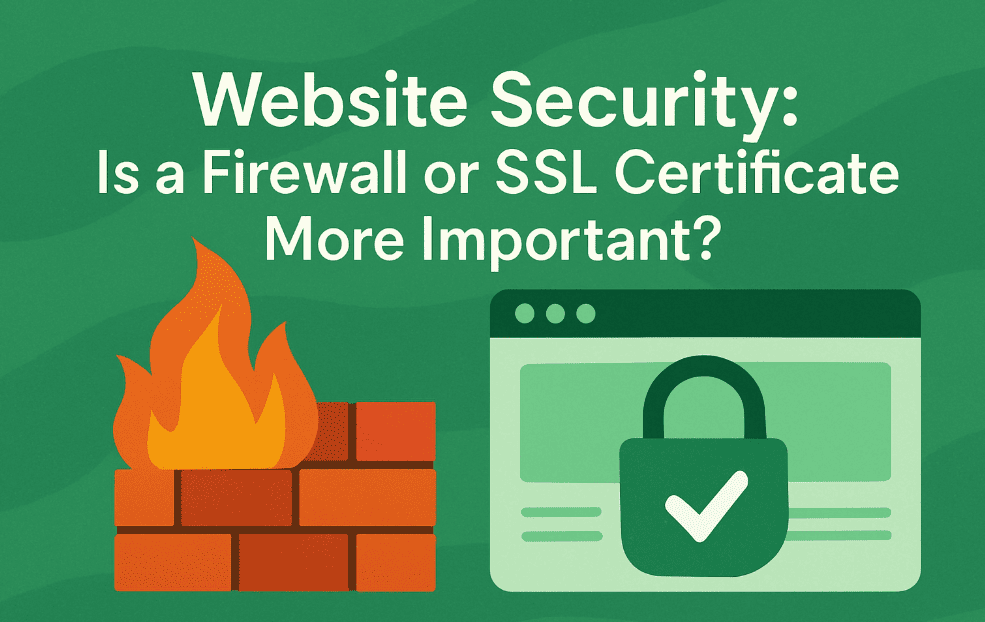Confused About the Role of Firewalls and SSL Certificates in Website Security? Understanding the difference between a firewall and an SSL certificate is essential for anyone looking to strengthen their website security.
When it comes to website security, both firewalls and SSL certificates play critical yet distinct roles. This topic is especially important for businesses that rely heavily on digital platforms for daily operations. A solid website security strategy involves multiple layers of protection. Firewalls act as the first line of defense by blocking unauthorized access and harmful traffic, while SSL certificates encrypt data transmission, safeguarding sensitive information from hackers.
In this article, we’ll break down how these two technologies complement each other to provide complete website security and why using both is the smartest approach to protect your website and customer data.
The Essential Role of Firewalls
Firewalls play a vital role as the first layer of defense against cyber threats. Acting as a digital gatekeeper, a firewall monitors, filters, and manages both incoming and outgoing data traffic across your network. This proactive system helps detect suspicious activity in real-time and automatically blocks unauthorized access before it can cause harm.
By creating a strong barrier between your internal systems and external threats, firewall protection ensures that critical infrastructure, such as servers, websites, and user devices, remains secure. For any organization aiming to strengthen its website security, implementing a reliable firewall is a crucial step in preventing data breaches and maintaining system integrity.
Read Also : Which SSL Certificate is right for your website?
How Firewalls Work to Strengthen Website Security
Understanding how firewalls work is key to building a solid website security strategy. When data is transmitted over the internet, it’s broken down into smaller units called data packets. These packets travel through various network points, such as routers, servers, or cloud systems, before reaching their destination.
A firewall acts as a security checkpoint, carefully analyzing each data packet before granting it access to your network. This helps detect and block malicious or suspicious activity before it can compromise your system. Whether deployed on local networks, endpoint devices, or cloud environments, the primary role of a firewall remains consistent: to filter network traffic and prevent unauthorized access.
By integrating firewall protection into your infrastructure, you significantly reduce the risk of cyberattacks and improve the overall integrity of your website security.
Firewall vs SSL: Why You Need Both for Complete Website Security
When it comes to website security, the smartest move isn’t choosing between a firewall or an SSL certificate, it’s using both in tandem. This integrated approach provides dual-layer protection: the firewall defends your network from unauthorized access, while the SSL certificate encrypts sensitive data shared through your website.
As data travels from the user’s browser to your network, built-in SSL features from your firewall provider help secure that communication. Meanwhile, data moving from your server or hosting environment to the firewall is better protected with a premium SSL certificate, like those offered by SSL Malaysia.
This layered defense strategy significantly reduces the risk of data breaches, enhances network protection, and ensures complete security. Firewalls play a vital role in blocking malicious traffic, while SSL certificates not only secure the data stream but also boost customer trust and improve your site’s credibility in the digital landscape.
Read Also : Free SSL vs Paid SSL, which one is right for you?
Conclusion
When it comes to website security, firewall and SSL certificate are not interchangeable options, you need both to ensure full protection. A firewall safeguards your network by filtering incoming and outgoing traffic, effectively blocking external threats. Meanwhile, an SSL certificate secures the communication between users and your website, ensuring data integrity during transmission. Therefore, implementing both a firewall and an SSL certificate together is the most effective strategy to protect your system and sensitive data from cyber risks.
Website Security Solutions with SSL Malaysia
Companies like SSL Malaysia, a trusted Digital Asset Protector, offer comprehensive security solutions to enhance your online safety. By providing premium SSL certificates, email signing services such as S/MIME and Verified Mark Certificates (VMC), along with dedicated Security Operation Center support, SSL Malaysia stands as a reliable partner in securing your digital assets. As a global distribution partner of leading Certification Authorities—including Digicert, Symantec, GeoTrust, Thawte, RapidSSL, Globalsign, and Sectigo (formerly Comodo CA)—SSL Malaysia helps businesses achieve optimal website security with trusted, world-class certificates. Choosing the right security provider is key to safeguarding your website and maintaining user trust in today’s digital landscape. Contact us now!





